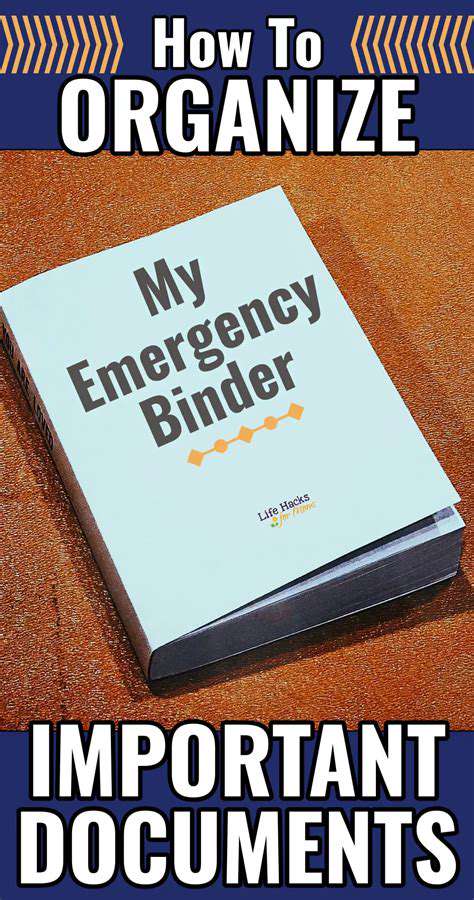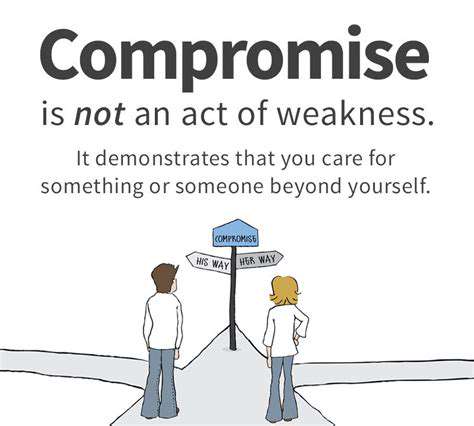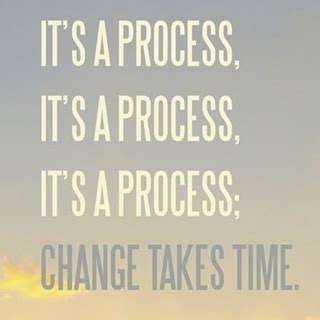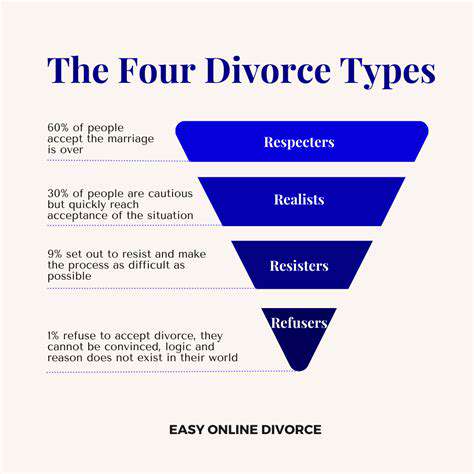step by step divorce preparation tips
Catalog
Organize financial and legal paperwork strategically for divorce proceedings
Gain financial clarity to make empowered decisions during separation
Build emotional and practical support networks during transition
Select legal counsel matching your unique situation requirements
Document child-related information thoroughly for custody discussions
1. Assemble Important Documents

1. Gather Financial Statements
Getting your financial paperwork in order should be priority number one when facing divorce. Start by collecting recent bank statements, tax filings from the past three years, retirement account summaries, and pay stubs. Seeing the full financial picture - both yours and your spouse's - helps prevent surprises and creates realistic expectations for negotiations. Don't forget to check credit card statements and loan documents, as hidden debts often surface during this process.
Many people find it helpful to make color-coded folders for different account types. This organizational trick makes information easier to find during stressful meetings. Consider scheduling a consultation with a forensic accountant if you suspect hidden assets or complex financial holdings. They can spot red flags in tax returns that untrained eyes might miss.
2. Compile Legal and Personal Documentation
- Original marriage certificate (plus two copies)
- Children's birth certificates and vaccination records
- Property deeds and vehicle titles
- Passports and social security cards
While financial documents get most attention, personal papers form the backbone of your legal case. That marriage certificate isn't just sentimental - it's the legal proof needed to start divorce proceedings. If you've moved states since marrying, double-check residency requirements with your attorney.
For parents, school records and medical histories become crucial. Documenting your involvement in daily routines gives weight to custody arguments during negotiations. Snap photos of important papers with your phone as backup, but keep originals in a secure location like a safe deposit box.
2. Understand Your Finances
Mapping Financial Terrain
Divorce reshapes your financial landscape completely. Start by making two lists: one for assets (what you own) and another for liabilities (what you owe). Include everything from the family home to frequent flyer miles - courts often consider all assets marital property. Many people forget about digital assets like cryptocurrency wallets or online businesses, so do a thorough inventory.
Valuation challenges often arise with collectibles or inherited items. That antique piano might need professional appraisal. For retirement accounts, note the vested balance rather than current value. Remember: dividing a 401(k) requires specific court orders called QDROs to avoid tax penalties.
Budgeting for New Realities
Post-divorce life brings financial changes most people underestimate. Create three budget scenarios: 1. Maintaining current lifestyle 2. Moderate cost-cutting 3. Essential expenses only
This exercise reveals what's truly negotiable versus non-negotiable in settlements. Childcare costs often surprise parents - the average family spends $10,000 annually per child according to recent Census data. Factor in potential changes like health insurance shifts or transportation needs if relocating.
Professional Financial Guidance
While friends mean well, their divorce financial advice often misses crucial details. A certified divorce financial analyst (CDFA) can:- Project tax implications of different settlement options- Calculate long-term impacts of keeping vs selling homes- Model retirement scenarios based on asset division
Many law firms now partner with financial experts because money decisions made during divorce echo for decades. For business owners, valuation specialists become essential - emotional attachment often clouds objective assessments of company worth.
Rebuilding Financial Identity
Joint accounts create lingering financial ties. Start establishing individual credit by:- Opening a new checking account- Applying for a low-limit credit card- Setting up utility bills in your name
Monitor your credit report monthly through AnnualCreditReport.com - 34% of divorcing couples report discovering hidden debts according to a 2023 FTC study. Update beneficiaries on life insurance and retirement accounts, as outdated designations can override divorce decrees.
3. Develop a Support System

Building Your Team
Divorce isn't a solo journey, despite how isolating it can feel. Assemble a personal board of advisors including:- Trusted friend for emotional support- Therapist specializing in life transitions- Accountant for financial questions- Fitness coach for stress relief
Schedule regular check-ins with your support team - weekly coffee dates or monthly Zoom calls help maintain consistency. Many find divorce support groups invaluable; organizations like DivorceCare offer structured programs blending practical advice with emotional healing.
Professional Support Options
- Co-parenting counselors for child-focused strategies
- Divorce coaches for procedural guidance
- Estate planners for post-divorce adjustments
Specialized professionals fill crucial gaps traditional support networks can't. A parenting coordinator helps implement custody agreements, while mediators facilitate difficult conversations. Investing in these services early often reduces legal costs by preventing escalations to court.
Don't overlook practical helpers - real estate agents familiar with divorce sales or professional organizers for household transitions. These experts smooth logistical challenges while you focus on emotional healing.
4. Choose the Right Legal Representation
Finding Your Legal Match
Not all divorce attorneys approach cases the same. During consultations ask:- What percentage of your practice focuses on divorce?- How do you typically communicate with clients?- What's your philosophy on settlement vs litigation?
Look for someone whose style matches your needs - aggressive litigators aren't ideal for collaborative divorces. Many bar associations offer attorney search tools with disciplinary records and peer reviews. Trust your gut - if you feel rushed or dismissed during consultations, keep looking.
Alternative Dispute Options
Courtroom battles aren't inevitable. Explore:- Mediation (neutral third-party facilitator)- Collaborative divorce (team-based approach)- Arbitration (private judge system)
These alternatives often save time and money while reducing conflict. A 2022 American Bar Association study found mediated divorces cost 40-60% less than litigated cases on average. However, they require mutual willingness to compromise - assess your situation realistically.
5. Prepare for Child Custody Arrangements
Child-Centered Documentation
Courts prioritize children's well-being above all. Build your case with:- School communication logs showing your involvement- Medical records documenting care responsibilities- Photos/videos of quality time together
Create a proposed parenting plan detailing:- Weekly schedules- Holiday rotations- Decision-making processes
Even if negotiating directly with your spouse, having this document shows serious commitment to co-parenting. Many family courts provide template parenting plans to help structure your proposal.
Co-Parenting Communication Strategies
Establish ground rules early:- Use dedicated apps like OurFamilyWizard for all communication- Set response time expectations (24-48 hours)- Agree on conflict resolution methods
Document all interactions - 70% of custody modifications arise from communication breakdowns according to family law attorneys. Keep exchanges factual and child-focused, avoiding emotional language. Consider parallel parenting strategies if high conflict persists.







